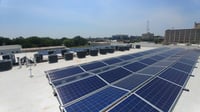Introduction
The solar industry is the fastest growing industry in the world. Growth presents new business opportunities, such as wholesale solar equipment brokering. Whether you are a full-time solar broker, a solar company who wants to adopt broker best practices, a broker from another industry interested in expanding into the solar industry, or you are curious to learn more about equipment brokering, this guide will provide you with information to maximize your wholesale solar equipment brokering efforts.
The information presented is based on industry research and over twenty years of direct experience working with more than 15,000 wholesale equipment buyers and sellers. This guide is updated regularly to offer timely and relevant information.
Solar Equipment Brokering Defined
Throughout the global solar industry, a new player has emerged – the solar equipment broker – and has gained credibility as a viable business opportunity for those who possess the skills and knowledge to best leverage their firms.
To grasp the general concept of brokering, think about how brokering plays out in the secondary market, where the broker acts as an intermediary between a buyer and a seller. The broker handles negotiations and any corresponding services of a transaction on a commission basis. The broker’s ideology rests on the principle of “buy low, sell high.”
Many types of solar brokers exist, and they tend to offer a wide array of services based on their core competencies, such as site assessments, array design, permitting, financial options, tax incentives and rebate filings, vetting installers, and collecting full system quotes. However, for the purpose of this guide, we are primarily focused on the function of buying and selling solar equipment on behalf of clients.
Without the necessary equipment, a solar array is nonexistent. The costs associated with solar equipment, including hardware costs, transportation costs, and inventory costs, directly impact quotes to clients and their decisions to invest in solar.
Why the Solar Industry needs Equipment Brokers
Regardless of what capacity solar brokers are operating in, keeping tabs on the best equipment deals and mastering efficient supply chain processes is crucial for maintaining a competitive edge in the solar industry. Assuming that local installers have access to the best solar equipment deals is, in many cases, not true. Rather, a solar broker would want to seek out the optimal deal for clients, either by tapping into his/her network or by accessing the network of a broker who specializes in equipment brokering.
Equipment brokers are common throughout other commodity industries where an established secondary market exists. Brokers tend to use the internet to connect to the secondary market, gain global access to products and streamline transportation logistics processes.
For instance, our experience is based on over fifteen years of working closely with more than 13,000 equipment brokers in the IT industry who connect daily on the BrokerBin B2B exchange platform to network and trade product. We have witnessed first-hand how the entrant of brokers into the IT industry has cut costs by as much as 70%.
Because of their specialized expertise in market intelligence and handling goods, equipment brokers are poised to benefit the solar industry while reaping individual benefits as well. From our initial three years’ experience working with brokers on the EnergyBin B2B exchange platform, we have proven evidence of cost reductions starting at 20%. As more brokers expand into the solar industry, we expect project capital costs to continue to drop by as much as 70%.
Further Reading
 Learn more about how equipment brokers benefit the solar industry.
Learn more about how equipment brokers benefit the solar industry.
 Learn about the secondary market and the reasons why it is good for the solar industry.
Learn about the secondary market and the reasons why it is good for the solar industry.
 Read about trends in the secondary solar market and opportunities to make and save money.
Read about trends in the secondary solar market and opportunities to make and save money.
 Learn about opportunities in solar panel reuse and recycling.
Learn about opportunities in solar panel reuse and recycling.
Common Characteristics of Equipment Brokers
On EnergyBin, we have been tracking a number of equipment brokers who have emerged since the online B2B exchange launched in 2016. Although we have observed a number of different business models, we have noticed some consistencies from broker to broker that mirror the core competencies of the IT brokers we work with on BrokerBin.
These brokers are using EnergyBin to network and keep tabs on market intelligence in addition to attending trade shows and other networking events.
They are quick to reach out to their account reps for leads and consider EnergyBin representatives as an extension to their teams.
Brokers are listing inventory on EnergyBin and sending out Want-to-Buy and Want-to-Sell emails for specific equipment.
Their listed inventory for sale is competitively priced and usually lower than what can be found through the traditional supply chain.
Their equipment for sale is guaranteed in quality per industry standards and almost always backed by the manufacturer’s warranty. In some cases where the manufacturer’s warranty does not apply, brokers have the means to provide a warranty backed by their assets.
Brokers are representing clients throughout the world.
 Learn how brokers prosperously work around supply chain constraints by adding value to their customer relationships.
Learn how brokers prosperously work around supply chain constraints by adding value to their customer relationships.
![]() Want to take your company global? Check out three essential resources that every U.S. solar equipment exporter should know and use.
Want to take your company global? Check out three essential resources that every U.S. solar equipment exporter should know and use.
 Learn how adding brokering as a service can diversify your business model.
Learn how adding brokering as a service can diversify your business model.
 Utilize EnergyBin's Broadcast feature to notify industry peers of your buy/sell needs.
Utilize EnergyBin's Broadcast feature to notify industry peers of your buy/sell needs.
Equipment Broker Knowledge and Skills
The basic skills and knowledge of equipment brokers tends to mirror that of brokers in any industry. The following list of skills and knowledge directly contribute to a broker’s success.
Communication Skills – Brokers are masters at networking, whether via email, phone or in person. They are effective speakers who engage their audiences to convey clear and concise information. They are astute to interpersonal and social perceptiveness cues. They are active listeners and are able to drill down to the core needs of their clients.
Sales and Negotiating Skills – Brokers are knowledgeable of the principles and methods of prospecting leads, product demonstration, presenting influential proposals, persuading others to change their minds or behavior, negotiating and closing deals.
Customer Service – Brokers thoroughly conduct customer needs assessments. They meet quality standards for services. They follow up with customers to ensure customer satisfaction is intact.
Critical Thinking – Brokers know where to glean the knowledge they need to effectively and efficiently operate in the industry. Some brokers specialize in a technical or scientific product, excel at tracking price trends, equipment use and installation techniques, while others build partnerships to gain the expertise they themselves lack.
Complex Problem Solving – Because brokers are intently focused on maintaining low overhead costs and transfer of goods costs, they are resourceful in problem solving to overcome any obstacles that interfere with efficient processes.
Additional skills and knowledge may be needed for specialized services offered by the broker, depending on the scope of the broker’s firm.
 Learn how the broker's skill set benefits wholesale buyers.
Learn how the broker's skill set benefits wholesale buyers.
 Get expert advice from FabTech Solar Solutions about solar panel reuse and recycling.
Get expert advice from FabTech Solar Solutions about solar panel reuse and recycling.
 Read how The Megawatt Group has grown to a multi-million dollar brokering firm within five years.
Read how The Megawatt Group has grown to a multi-million dollar brokering firm within five years.
 Check out this interview with Golden Gate Solar Tech on what it takes to be a successful solar equipment broker.
Check out this interview with Golden Gate Solar Tech on what it takes to be a successful solar equipment broker.
Buying and Selling Solar Equipment
In our experience, we have seen many types of equipment broker business models where brokers operate in one or more capacities. Because of the nature of their work, many brokers do not confine themselves to only buying or selling equipment.
Rather, brokers have the freedom to buy and sell. They tend to base the decision to buy and sell on the needs of their clients, unless a significant reason presents itself to conduct business otherwise.
Note that a broker may be engaged in the purchase or sale of equipment without ever taking ownership of the product, as he/she is acting on behalf of his/her client, who assumes financial responsibility.
Whether or not possession of goods is taken, brokers should be able to verify the products they represent. Supply chain transparency is especially important in the solar industry where buyers expect solar equipment for sale to meet quality standards, corporate social responsibility requirements, environmental considerations, and applicable laws. A number of reputable brokers have adopted SEIA's Solar Equipment Buyers' Guide for Supply Chain Traceability and tend to ask the following questions to suppliers before buying or representing equipment.
- Do you follow the SEIA Traceability Protocol? If not, why not?
- Do you and your suppliers have a corporate social responsibility code of conduct or policy in place? If so, can you share it?
- Does your code of conduct address the areas covered by the International Labor Organization's core labor standards?
- Do you communicate your code of conduct to your suppliers?
- What steps do you take to ensure that you and your suppliers are in compliance with [region's] laws and regulations?
- Can you show where the product is manufactured and where the inputs come from?
- Can you provide the most recent independent audit reports regarding your claims?
- Who conducted the audit? Was it conducted by a qualified, independent third-party organization?
- Are the audits announced or unannounced? How often are audits conducted?
Here are a few scenarios that illustrate why a broker would take part in buying and selling solar equipment.
- Procurement Facilitator for a Client: A broker has a client who is ready to invest in a solar array. The broker will obtain quotes for the equipment options that best match his/her client’s needs and specifications. Once the client has selected a quote, the broker will proceed with negotiating the price and terms of sale.
- Purchasing Agent: A broker is contracted by a Developer or EPC to act as a purchasing agent for a specific project design. The broker is responsible for procuring the specific product needed, negotiating the price and terms of sale, completing the contract agreement, and scheduling transportation logistics.
A broker is commissioned by a distributor or supplier to purchase inventory for resale because the broker has connections that would put the distributor/supplier at a competitive advantage beyond their regular sourcing channels.
A broker is hired by a Contractor or Installer to locate a hard-to-find replacement part (single or multiple quantities) for an existing array and to satisfy a customer’s need.
- Buyer: A broker decides to purchase inventory (and take ownership of the product) at a designated price that he/she knows has a strong potential to resell at a higher price. The broker may or may not have a buyer lined up to sell the product to, but because of the strength of his/her network, the broker is confident that such a purchase would be to his/her benefit.
 Read about shopping online for wholesale solar equipment.
Read about shopping online for wholesale solar equipment.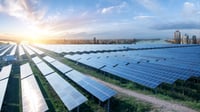 Get tips for buying wholesale solar equipment.
Get tips for buying wholesale solar equipment.
 Access these five sources to find quality PV products to buy at wholesale.
Access these five sources to find quality PV products to buy at wholesale.
- Seller: A broker represents either a single organization or multiple companies and sells a range of products on their behalf. In some cases, the broker may never take ownership of the product and will simply charge a commission fee to each client.
In other cases, the broker may search for specific brands that he/she represents to buy the inventory low and then sell at a higher mark-up. The broker is resourceful at locating product via online marketplaces/exchanges as well as going into companies’ warehouses, taking note of their stock and making an offer to purchase any product that matches the brands the broker is looking for. The broker may receive technical product training from the companies he/she represents, or may partner with a technical expert provided by a solar company.
 Read about how you can use online selling tools to amplify your company sales and build your credibility.
Read about how you can use online selling tools to amplify your company sales and build your credibility.
 Get tips for selling wholesale solar equipment.
Get tips for selling wholesale solar equipment.
- Reseller: A broker sets up a sales channel to resell product that he/she acquired at a low bid, for example surplus product, clearance product, excess equipment from a cancelled project, or used hardware and adds a mark-up to the resale price.
In some cases, the broker may add value to the product by providing in-house quality assurance testing and a warranty. A broker engaged in reselling will target other brokers, developers, EPCs, solar contractors, residential and commercial installers, and DIY consumers as prospective customers.
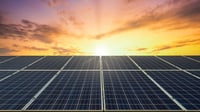 Read how resellers play a key role in the secondary market to re-market and resell stranded and distressed PV equipment.
Read how resellers play a key role in the secondary market to re-market and resell stranded and distressed PV equipment.
 Read about how a surplus reseller leverages its network to gain new customers and pricing insights.
Read about how a surplus reseller leverages its network to gain new customers and pricing insights.
 Read about how an online reseller makes new connections and gains efficiency in daily operations.
Read about how an online reseller makes new connections and gains efficiency in daily operations.
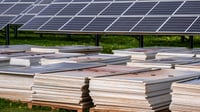 Refer to this guide if you have used solar panels to assess whether you should resell or recycle them.
Refer to this guide if you have used solar panels to assess whether you should resell or recycle them.- Refurbished Goods Seller: A broker will purchase recycled product, scrap or damaged equipment, repair and repackage the product for resale. Or, a broker will offer equipment for resale that has been refurbished by a reputable repairer. The broker will test the product for quality assurance and may add a warranty as well.
More Resources
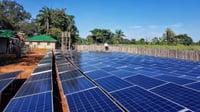 Learn about what to do - repair, resell or recycle - when it comes to used solar panels.
Learn about what to do - repair, resell or recycle - when it comes to used solar panels.
 Read how to inspect and test used solar panels for resale.
Read how to inspect and test used solar panels for resale.
 Read about buyer considerations for purchasing refurbished solar panels and inverters.
Read about buyer considerations for purchasing refurbished solar panels and inverters.
 Read about best practices of wholesale solar equipment resellers..
Read about best practices of wholesale solar equipment resellers..
Wholesale Solar Equipment Brokering Best Practices
The following insights are taken from our experience working with equipment brokers for over fifteen years and what we have learned about the solar industry. These best practices are meant to be guiding principles for brokers aiming to achieve high-level business goals and sustainability in a competitive field.
1. Connect to solar companies and other brokers on an online B2B exchange.
Membership to an online B2B exchange comes with many benefits, including the ability to:
- Connect with buyers and sellers who are ready to deal.
- Network with solar companies who are looking for sales representatives and resellers to represent their products.
- Search for the best solar equipment deals and hard-to-find replacement parts for your customers.
- List inventory for sale.
- Gain insights on market intelligence including pricing, and supply and demand.
- Keep an eye on your competitors’ activities.
It is important to join an exchange network that vets its members. At EnergyBin, for example, there are several qualifications that a company must meet in order to receive an invitation to join the exclusive network.
 Grow your network by leveraging the tools available to you on EnergyBin.
Grow your network by leveraging the tools available to you on EnergyBin.
Read the 2024 PV Module Price Index presented by EnergyBin, which tracks prices for c-Si modules traded within the secondary market.
 Read about how Surplus Solar Products connects to new qualified buyers on EnergyBin.
Read about how Surplus Solar Products connects to new qualified buyers on EnergyBin.
Also take note that some B2B exchanges offer ongoing support in matching buyers with sellers. However, be aware that such added services may come with transaction fees, which are usually a percentage of the sale that takes a big chunk out of earned revenues.
Exchanges offer a wealth of market intelligence. For example, on EnergyBin, members can access PV hardware trade data on price, availability, quantity, quality, location, buyer/seller contact information, and more. Often, this information tends to holder greater value and the products themselves.
 Read the PV Hardware Trade Analysis H1 2025 for a sample of market intelligence available on EnergyBin.
Read the PV Hardware Trade Analysis H1 2025 for a sample of market intelligence available on EnergyBin.
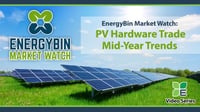 Watch the video to learn about PV hardware trade trends.
Watch the video to learn about PV hardware trade trends.
2. Attend solar events to network with solar companies and learn about the latest product technology and market trends.
A wide array of solar events exist that offer networking and learning opportunities. Because the solar industry is a relationship-oriented industry, attending solar events is worth the investment of time and resources.
If you have never been to a solar event, we recommend that you spend your first time visiting with as many solar companies as possible. Walk the exhibit floor. Attend sessions on industry trends, innovations and other topics of interest. Participate in product demonstrations.
A note to the wise, with so many solar events to choose from, it is important to scrutinize each event to determine if it is a good fit for your business. In the end, if you don’t come away with a reasonable number of qualified leads, that event is probably not worth your time to attend.
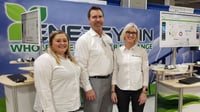 Read about the top 5 tips we recommend to maximize your solar event investment.
Read about the top 5 tips we recommend to maximize your solar event investment.
3. Stay up-to-date on industry trends and market intelligence.
Read trade publications. Subscribe to newsworthy blogs and newsletters. Read industry reports. Participate in webinars.
As previously mentioned, valuable data on market intelligence is a benefit of belonging to an online B2B exchange. Knowing pricing, product specs, and supply and demand is critical to a broker’s daily operations and business strategy. With this information in hand, the broker is able to successfully buy low and sell high again and again.
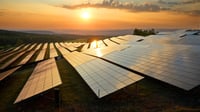 Read about market conditions that affect solar panel pricing and availability.
Read about market conditions that affect solar panel pricing and availability.
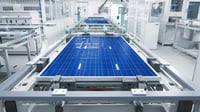 Learn about three conditions affecting today's solar panel market and how your brokerage firm can benefit.
Learn about three conditions affecting today's solar panel market and how your brokerage firm can benefit.
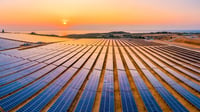 Review trends that are driving module availability and pricing in the secondary market to grow your business.
Review trends that are driving module availability and pricing in the secondary market to grow your business.
 Read how Kinect Solar uses EnergyBin to gauge market pricing and get a pulse on what equipment is available in the secondary market.
Read how Kinect Solar uses EnergyBin to gauge market pricing and get a pulse on what equipment is available in the secondary market.
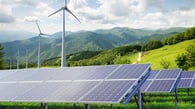 Read about three economic drivers that make viable today's solar secondary market and create new opportunities for the future.
Read about three economic drivers that make viable today's solar secondary market and create new opportunities for the future.
 Learn about the used solar panel market and buyer considerations when it comes to used modules.
Learn about the used solar panel market and buyer considerations when it comes to used modules.
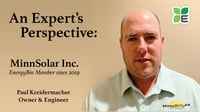 Read about what types of solar panels wholesale buyers are in the market for from an expert's perspective.
Read about what types of solar panels wholesale buyers are in the market for from an expert's perspective.
4. Know the general policies affecting your market(s), such as Investment Tax Credits, tariffs, rebates, permits, and other legislation.
In the U.S., brokers are faced with policies and legislation on federal, state and local levels. Many of the trade publications will keep subscribers up-to-date on such issues. In addition, joining a trade association, like Solar Energy Industries Association, is a good way to not only get the latest news on policies but also get involved in advocacy efforts.
For international transactions, we would recommend that you partner with a customs broker if you are lacking such expertise. Customs brokers specialize in moving product across borders efficiently and are well versed in international trade legislation.
 Read about resources available to solar equipment brokers that provide quick access to policy and incentives information.
Read about resources available to solar equipment brokers that provide quick access to policy and incentives information.
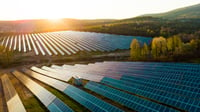 Learn how solar companies are finding success via resale in the secondary market amidst challenging trade policies.
Learn how solar companies are finding success via resale in the secondary market amidst challenging trade policies.
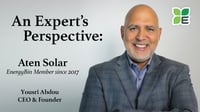 Read about how policies affect the U.S. solar panel market from an expert reseller.
Read about how policies affect the U.S. solar panel market from an expert reseller.
5. Add value to the customer experience.
Don’t just preach the lowest price! The solar industry is intent on providing price feasibility AND quality product and service. The lowest cost panel is not always the best choice for the customer if it falls short of their energy consumption needs.
Many solar brokers have created business models with value-added services to provide a holistic experience for their customers. Consider ways you can add value based on your core competencies.
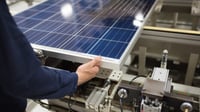 Learn about secondary market solutions, including resale, solar panel and inverter remanufacturing, and recycling.
Learn about secondary market solutions, including resale, solar panel and inverter remanufacturing, and recycling.
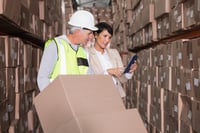 Read about how solar equipment brokers help solar companies clean out and resell their excess stock.
Read about how solar equipment brokers help solar companies clean out and resell their excess stock.
6. Form partnerships with others who excel at strengths you don’t have – think Adam Smith’s Law of Comparative Advantage!
The famous economist, Adam Smith, first coined the concept of comparative advantage in The Wealth of Nations (published in 1776). Essentially, he argued that a country should engage in international trade for any given commodity when another country has succeeded in producing that same commodity with greater efficiency. This same concept can be viewed from a micro-economic level with respect to individuals and companies.
For example, if you are a master at solar equipment procurement but lack the skills needed to design solar arrays, partner with a solar design engineer to create a value-added service to your customers.
Or, consider what partnerships you can form that provide secondary market solutions to your customers as their solar systems mature. Have a plan in place for PV repair, resale, and recycling to service your customers through system end-of-life.
You don’t need to know everything there is to know about solar. But you should know who you can connect with in your network to fully satisfy your customers' needs.
 Read about how to network with the goal of forming partnerships for life.
Read about how to network with the goal of forming partnerships for life.
.jpg?width=200&name=From%20IT%20to%20PV%20-%20How%20an%20IT%20Reseller%20Switched%20to%20Solar%20(1).jpg) Learn how FabTech, a solutions provider for solar panel recycling and refurbishing, uses EnergyBin to make new connections.
Learn how FabTech, a solutions provider for solar panel recycling and refurbishing, uses EnergyBin to make new connections.
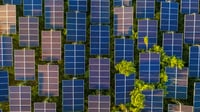 Read about the state of solar panel recycling in North America.
Read about the state of solar panel recycling in North America.
7. Know your customers’ needs through and through.
The decision to create value-added services as components of your overall business model strategy will come down to how well you know the needs of your ideal customers. If you are just starting out in solar, take time to research those companies and/or individuals who would be your ideal customers.
As you meet with customers, ask them qualifying questions that fully address their needs, and clarify what you heard them say. Review expectations and next steps. Follow up with meeting recap correspondence and additional questions to further gain clarity and ensure you satisfy their expectations.
 Read about best practices to earn trust with your prospective buyers in this digital age.
Read about best practices to earn trust with your prospective buyers in this digital age.
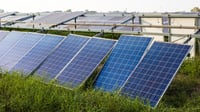 Learn about the opportunities that repowering projects present, and how brokers can help source new and resell old PV hardware.
Learn about the opportunities that repowering projects present, and how brokers can help source new and resell old PV hardware.
 Consider adding value to the customer experience by including complimentary hardware audits and other asset disposition services.
Consider adding value to the customer experience by including complimentary hardware audits and other asset disposition services.
8. Keep tabs on what your competitors are doing.
The solar industry is highly competitive. Taking the time to identify and analyze your competitors will help you stay one step ahead of them. Check out their websites from time to time. Watch their activity on online B2B exchanges. Subscribe to their newsletters. Follow them on social media.
To maintain a competitive edge, explore new ways that your business can evolve and grow. Many best practice strategies exist in the field of business that you should regularly review. Adopt those strategies that best fit with your organizational culture and business goals.
 Learn more about how your company can gain a competitive advantage with a Corporate Social Responsibility strategy.
Learn more about how your company can gain a competitive advantage with a Corporate Social Responsibility strategy.
 Learn how to set up a competitive analysis to routinely track your competitors. Discover tricks to quietly (yet legally) collect competitive intelligence.
Learn how to set up a competitive analysis to routinely track your competitors. Discover tricks to quietly (yet legally) collect competitive intelligence.
9. Streamline processes and seek ways to continually reduce costs.
Those companies who “race to the bottom” on solar equipment costs tend to fail in the solar industry. Rather, companies must strive to reduce costs without sacrificing quality.
In order for solar to become a mainstream consumable, the overall cost to install a solar array must come down. Plus, those companies that continuously improve their processes and reduce costs gain a competitive advantage.
 Streamline resale valuations and end-of-life appraisals with agentic AI solutions.
Streamline resale valuations and end-of-life appraisals with agentic AI solutions.
 Read about how a freight broker can help reduce logistics costs for solar equipment truckloads.
Read about how a freight broker can help reduce logistics costs for solar equipment truckloads.
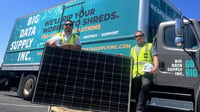 Read how a solar equipment reseller and recycler strives to create a zero net cost for those clients seeking decommissioning services.
Read how a solar equipment reseller and recycler strives to create a zero net cost for those clients seeking decommissioning services.
 Learn how the R2 Standard for solar panel reuse and recycling maintains quality while offering a lower-cost option to buyers.
Learn how the R2 Standard for solar panel reuse and recycling maintains quality while offering a lower-cost option to buyers.
10. Look at the big picture of what solar power brings.
As part of the solar secondary market, you have a responsibility to minimize waste and advance renewable energy throughout the world. Consider how your company contributes to repair, resale, and recycling solutions. These three R's are crucial components of the solar industry achieving a circular economy status.
Think about all the add-on renewable energy commodities from electric vehicle chargers to energy storage units to smart thermostats and more that you can offer to customers who value clean energy solutions.
Many solar installers who meet with homeowners and businesses consult their customers on green solutions to achieve optimal energy efficiency. With new green technology hitting the market, more opportunities to buy and sell come into play.
Beyond technology add-ons, strive for innovation. Become a leader in sustainability where your business model positively impacts people, planet, and profits.
 Read about solar trends in the 2020s that open doors to new opportunities for solar equipment brokers to diversify your business models.
Read about solar trends in the 2020s that open doors to new opportunities for solar equipment brokers to diversify your business models.
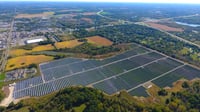 Learn about 10 tips to start a sustainability plan for your solar company.
Learn about 10 tips to start a sustainability plan for your solar company.
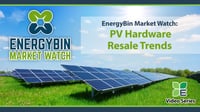 View this episode of EnergyBin Market Watch for resale trends and emerging value-added services.
View this episode of EnergyBin Market Watch for resale trends and emerging value-added services.
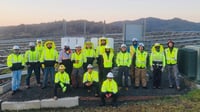 Learn about solar end-of-life special projects from PV decommissioning to recycling.
Learn about solar end-of-life special projects from PV decommissioning to recycling.
This page will be frequently updated with additional information for wholesale solar equipment brokers and anyone interested in becoming an equipment broker in the solar industry.


